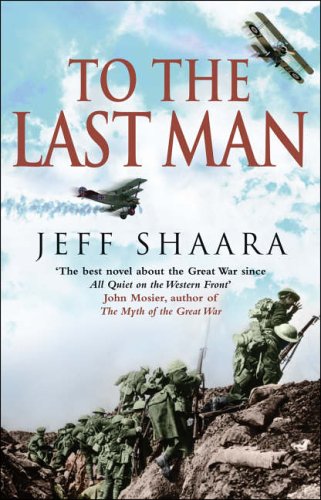Now I turn to the First World War, in Jeff Shaara’s historical novel, To The Last Man.
That’s “novel,” because while Shaara bases his books on first-person documents, contemporary correspondence, and facts, he also adds assumed and imagined dialogue and some actions, in order to help the reader better understand and imagine the feelings and events.
It is somewhat daunting when you first get the book, because it’s nearly 700 pages long. All of our protests as kids in school about books that were “too long!” can come to mind.
But pick it up. When I finally took the time to flip towards the back to see how many pages were in the book, I was already a third of the way through it. The writing grabs you from the first, as you enter an Allied trench alongside the only remaining soldier from a new unit that is attacked just as they start their walk between the high dirt walls. I do not know how men managed to avoid claustrophobia. Maybe they didn’t. Maybe they were so numb and scared from the fighting, they did not have time to think of it. But they slept in carved out spaces in the dirt walls, which often crumbled due to poor structure or bombing. They were usually left in the walls where they died, and the fighting went on, and on.
America was still not in the War by the first third of the book. By April, 2017 Wilson had declared war, but by July, 2017, Pershing and his staff were just arriving in France, preparing for training of the First Division. And the War ends in November, 2018.
The Red Baron is in this war, only 25 when he dies. His brother Lothar is also an ace pilot. The Americans who fight in the trenches under the Foreign Legion, or who fly in the French-based Lafayette Escadrille, do so as independents, not as Americans, as of mid-2017.
Captain Patton is here, anxious to fight, hopeful he won’t die never having fought in a large battle. “Black Jack” Pershing is in charge of the American fighting forces, but has to fight his own Allies, and government, nearly as much as he does the Germans in order to have his men be trained in American techniques, under American commanders, and fighting as American troops.
Did you know all of this? I did not. I am sorry to say that all I knew of WWI before this book, was that there was a Red Baron (who did NOT make frozen pizzas, or fight a flying cartoon beagle), and that an Archduke had somehow triggered the war by being assassinated.
I read about Flanders. About more men dying in four months, than in the entire years of the Vietnam War. Through Shaara, I began to see soldiers and dates and facts, as people. Just, people. Scared and worried and afraid, but determined. On both sides. People who were caught up in tactics that should have been left behind a century before, that did not match up with the new-fangled submarines and airplanes, machine guns, and deadly poisonous gases. Of thousands of men on both sides, living and fighting day after terrible day in high-walled trenches. I do not know how any of them did that. I do not know how they endured it. They simply did it.
And Shaara writes in such a beautiful, flowing manner that as I said, I was well over a third of the way into the book before I ever flipped to the back to see just how many pages I’d be reading. I became so caught up in, interested in, devoted to the men in the book, their struggles and worries, their families, that the time passes quickly while reading, and you are soaring in the cold in the new airplanes, looking down, and above, all about you, hoping you find the enemy, before he finds you. Seeing below you the men in miserable roads and towns of hand-dug trenches. Coming overseas in huge ships, praying you will not be sunk by the new German u-boats. You are there. You are with these men. And you would not be human if you did not feel terrified, just as a reader.
You will even enjoy some humor in this book. I was surprised that one old American general offered a battle plan, when Wilson declared war, offering to invade Canada, “because nobody is there to fight against us and it’s so easily accessible right now.” Now tell me you didn’t roll your eyes when you read that! I did.
Enjoy this book. Treat yourself. It’s not like the history you read in school.
_ Roberta Jackson

